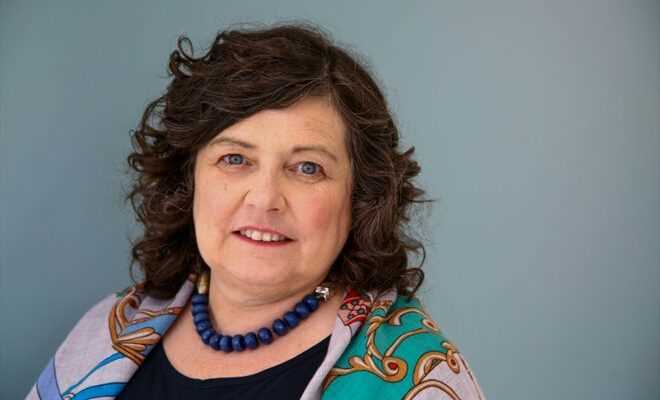The boss of Starling Anne Boden, in the offices of the British bank in Cardiff, May 11, 2022 (AFP / GEOFF CADDICK)
From the largest offices of the online bank Starling, we do not see the skyscrapers of the City but the more modest urban landscape of Cardiff, capital of Wales, which Anne Boden knows well.
“We have good universities and great talents in Cardiff, we use them to create something special for our customers”, claims the boss of the British bank on the occasion of the inauguration of this site where almost half of its 1,800 employees work.
With nearly 3 million users and an 8% market share among UK companies, Starling has successfully carved out a niche in the competitive world of fintech, and is turning a profit, which is rather rare in the industry. .
Herself from a modest family and a former student in Wales, Ms Boden describes her bank, launched in 2014, as “a strength that should not be underestimated”.
The comment also applies to the one who regularly describes herself as “a Welshwoman of one meter 52”: in the very masculine world of finance, she defends the place of women entrepreneurs and has been appointed to head a group reflection on the subject by the government.
Anne Boden claims not to be “a classic banker” and says she wants to offer her clients a different experience from that of the traditional banks for which she worked until 2013.
But in the wake of the 2008 financial crisis, the former employee of the Royal Bank of Scotland (RBS) must distinguish herself from many entrepreneurs who also want to shake up old-fashioned finance.
Then aged over 50, she teamed up with Tom Blomfield, a young entrepreneur under thirty, a former Oxford student… Typical of the London start-up community.
But in 2015, he jumped ship with a large part of the team a few months before the launch of Starling, to launch Monzo, a rival bank.

The boss of Starling Anne Boden, in the offices of the British bank in Cardiff, May 11, 2022 (AFP / GEOFF CADDICK)
In an autobiographical book, Anne Boden recounts this hard blow and her struggle to keep control of Starling and preserve her vision: a profitable but “responsible” bank, online but with customer service always accessible, attentive to the environment – Starling claims to use renewable energy and recycled plastic.
Its capitalization of more than two billion pounds ($2.5 billion) remains far behind that of the giant Revolut ($33 billion) or Monzo ($4.5 billion), but it often tops the charts. consumer satisfaction.
-No crypto “gadget”-
If Anne Boden laughingly maintains that she now has “cordial competition” relations with the other big names in British fintech, she does not hesitate to criticize them and praise Starling’s more cautious approach.
In her book, she detailed the painstaking work carried out to obtain a banking license before the launch of Starling, this Grail which allows loans to be made using the deposits of its customers and which now distinguishes it from certain competitors in the United Kingdom. .
The fintech giant Revolut is indeed not recognized as a bank in London, even if it is in several European countries, and the financial press regularly details its efforts to obtain a license.
According to Ms. Boden, it is precisely the banking activity that allows Starling to generate a profit.
“Some of these new fintechs are trying to make their user base profitable by coming up with offers for investing or buying cryptocurrency,” she said.
“We don’t need to look for gadgets,” she attacks.
She doesn’t hide her ambition: “In five years, people will be talking about Starling as a global technology company that has a very successful bank in the UK, and it starts here in Cardiff.”
If the boss of Starling does not answer questions about a possible IPO, which was planned for the end of the year or the beginning of 2023, she is more forthcoming on the future of the bank: “we are heading towards a future where the technology will be everywhere,” she believes, and banks will have to be able to offer, for example, “insurance calculated not every quarter but every moment or an automatic car that would be paid by the kilometer”.
© 2022 AFP
Did you like this article ? Share it with your friends with the buttons below.




